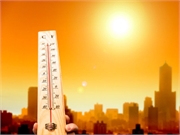Climate Change a 'Threat to Human Well-Being,' Scientists Say
By Dennis ThompsonHealthDay Reporter

TUESDAY, Nov. 5, 2019 (HealthDay News) -- A global coalition of more than 11,000 scientists warns that planet Earth is facing a "climate emergency" that will cause "untold human suffering" unless drastic steps are taken.
The warming climate is already taking a toll on human health, causing widespread hunger and illness that will grow exponentially worse, said the warning's lead author, William Ripple. He's a professor of ecology at Oregon State University College of Forestry, in Corvallis, Ore.
"In the end, our warning is about human well-being in that climate change is a major threat to human well-being," Ripple said.
Climate change has arrived and is accelerating faster than most scientists expected, with more severe effects, according to the paper published Nov. 5 in the journal BioScience. It is co-signed by 11,258 scientists from 153 countries.
The warning came one day after President Donald Trump served notice that the United States will withdraw from the Paris Agreement on climate change.
The scientists cited six immediate steps that must be taken to slow global warming:
- Implement massive energy conservation practices, including restrictions to slow the use of fossil fuels.
- Swiftly cut emissions of climate pollutants like methane, soot and hydrofluorocarbons, which could reduce the warming trend by more than half over the next few decades.
- Restore and protect natural ecosystems like forests, grasslands and wetlands, which play a role in controlling the greenhouse gas carbon dioxide.
- Focus on plant-based diets with fewer animal products, since raising livestock takes more resources and also emits methane and other greenhouse gases.
- Convert the global economy to one that acknowledges human dependence on the biosphere, and reduces exploitation of natural ecosystems that maintain planetary health.
- Pursue policies that stabilize the global human population, which is increasing by more than 200,000 people a day.
"We have an urgent situation, but it's not too late in that anything we do now will help relieve suffering in the future," Ripple said. "We already are committed to some climate change, but if we take effective action now we may be able to avoid catastrophic climate change."
The effects of global warming on human health are already apparent and growing worse, according to Ripple and Dr. Eric Cioe Pena, director of global health at Northwell Health in New Hyde Park, N.Y.
Mosquito and tick populations are spreading northward as the climate warms, bringing with them a number of infectious diseases, Ripple and Pena said.
"We now have Zika virus, which is endemic in Florida, in Miami," Pena said. "As the climate warms and becomes less temperate and more tropical, we're going to see Zika and Dengue, and some of these other more infectious diseases, spread throughout the U.S."
Extreme weather events that threaten human life and health also have become more common, the experts said.
"Just this week we're seeing a huge outbreak of wildfires in California," Ripple noted. These fires fill the sky with throat-choking smoke and threaten neighborhoods with destruction.
Hurricanes and tornadoes are also becoming more frequent and more ferocious, Pena added.
"We're going to see these superstorms more often, and the coasts are going to be threatened by that," Pena said.
There will be more hunger and starvation, as the changing climate threatens crop yields, and a warming ocean causes fish populations to decline, the experts explained.
Ripple said, "We already have hundreds of millions of humans who are hungry or starving, and that number could increase dramatically with severe climate change."
And Pena pointed out that it could get to the point where even clean water is hard to come by.
"Not to sound like Chicken Little and the sky is falling, but these are serious things," he said. "We're talking about the health security of millions of lives. That should be sobering to most folks."
More information
The U.S. Global Change Research Program has more about climate change and human health.

The news stories provided in Health News and our Health-E News Newsletter are a service of the nationally syndicated HealthDay® news and information company. Stories refer to national trends and breaking health news, and are not necessarily indicative of or always supported by our facility and providers. This information is provided for informational and educational purposes only, and is not intended to be a substitute for medical advice, diagnosis, or treatment.

